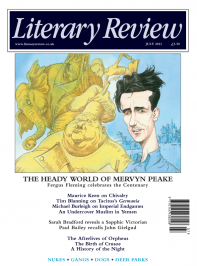Tim Blanning
Teutonic Troubles
A Most Dangerous Book: Tacitus’s Germania from the Roman Empire to the Third Reich
By Christopher B Krebs
W W Norton 303pp £18.99
Not many foreign sobriquets sound better in English than in their original language. One of them is Herman the German, which is certainly more catchy than Hermann der Cherusker. Leader of the Cherusci, a Germanic tribe, he lived from 17 BC to AD 21, and in AD 9 inflicted a crushing defeat on a Roman army led by Publius Quinctilius Varus at the Battle of the Teutoburg Forest. Although next to nothing is known about him, he was to enjoy colossal posthumous fame as a symbol of resistance to imperialism. Mythmaker-in-chief was the Roman politician and historian Tacitus, who hailed him as ‘Germany’s liberator’, a mighty hero who had successfully challenged the Roman Empire at the peak of its power.
Although Herman’s success was short-lived and he died at the hands of his own people, Tacitus ensured that he would come to personify the special virtues of the ancient Germans. He did this by writing Germania, which purported to be an account of the customs, laws, social relations

Sign Up to our newsletter
Receive free articles, highlights from the archive, news, details of prizes, and much more.@Lit_Review
Follow Literary Review on Twitter
Twitter Feed
How to ruin a film - a short guide by @TWHodgkinson:
Thomas W Hodgkinson - There Was No Sorcerer
Thomas W Hodgkinson: There Was No Sorcerer - Box Office Poison: Hollywood’s Story in a Century of Flops by Tim Robey
literaryreview.co.uk
How to ruin a film - a short guide by @TWHodgkinson:
Thomas W Hodgkinson - There Was No Sorcerer
Thomas W Hodgkinson: There Was No Sorcerer - Box Office Poison: Hollywood’s Story in a Century of Flops by Tim Robey
literaryreview.co.uk
Give the gift that lasts all year with a subscription to Literary Review. Save up to 35% on the cover price when you visit us at https://literaryreview.co.uk/subscribe and enter the code 'XMAS24'